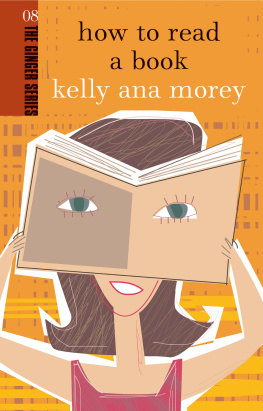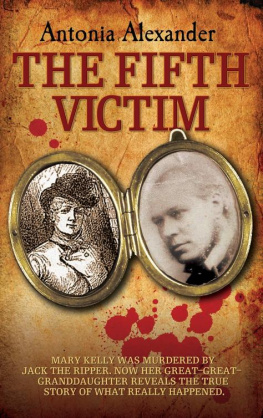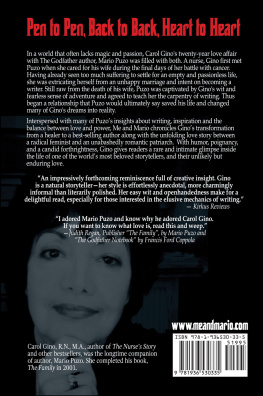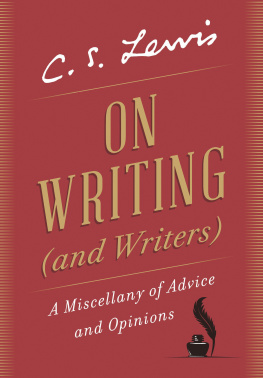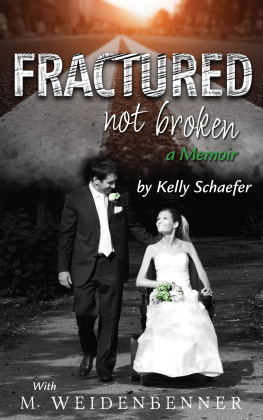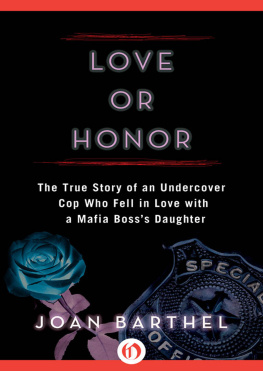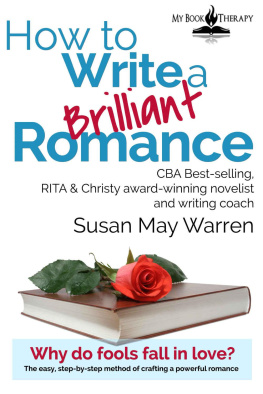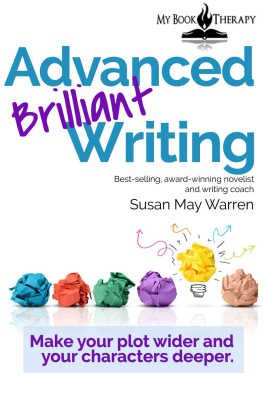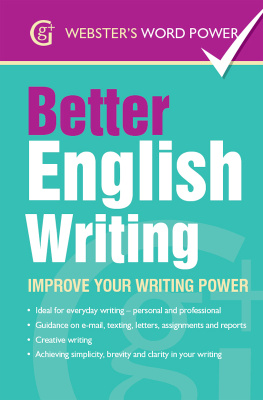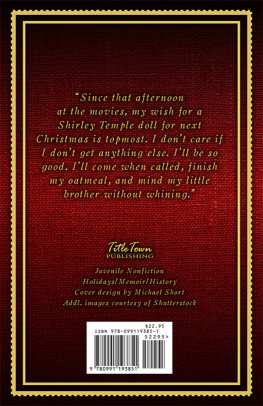Kelly Ana Morey - How to Read a Book
Here you can read online Kelly Ana Morey - How to Read a Book full text of the book (entire story) in english for free. Download pdf and epub, get meaning, cover and reviews about this ebook. year: 2016, publisher: Awa Press, genre: Art. Description of the work, (preface) as well as reviews are available. Best literature library LitArk.com created for fans of good reading and offers a wide selection of genres:
Romance novel
Science fiction
Adventure
Detective
Science
History
Home and family
Prose
Art
Politics
Computer
Non-fiction
Religion
Business
Children
Humor
Choose a favorite category and find really read worthwhile books. Enjoy immersion in the world of imagination, feel the emotions of the characters or learn something new for yourself, make an fascinating discovery.
- Book:How to Read a Book
- Author:
- Publisher:Awa Press
- Genre:
- Year:2016
- Rating:5 / 5
- Favourites:Add to favourites
- Your mark:
- 100
- 1
- 2
- 3
- 4
- 5
How to Read a Book: summary, description and annotation
We offer to read an annotation, description, summary or preface (depends on what the author of the book "How to Read a Book" wrote himself). If you haven't found the necessary information about the book — write in the comments, we will try to find it.
How to Read a Book — read online for free the complete book (whole text) full work
Below is the text of the book, divided by pages. System saving the place of the last page read, allows you to conveniently read the book "How to Read a Book" online for free, without having to search again every time where you left off. Put a bookmark, and you can go to the page where you finished reading at any time.
Font size:
Interval:
Bookmark:
A fine balance
Any publisher worth his or her salt will tell you that writing a novel for readers between the ages of 17 and 23 is a mugs game. With sex to be had, drugs to be taken, booze to be drunk and hearts to be broken, who has time to read? Or write? Or study? Or even attend lectures?
Bearing this in mind, it was unsurprising that my first two cracks at university were not entirely successful. The only redeeming grace was that, unlike many of my ilk, I never took it into my head to write tortured short stories and poems for the various literary journals and anthologies that abounded. With half a Bachelor of Arts in the bag, I abandoned university. Being far more interested in riding horses than studying the writing of dead people, I ended up in the Far North as a working pupil for a three-day-event rider named Jo. In return for helping around the place and not moaning too much, Jo taught me how to ride I mean really ride, not just stick on for a hoon down the beach.
At her place I reverted to my old habit of reading whatever I found lying around. At horse trials one of my greatest pleasures, when the day was done, was sitting on the ramp of the horse truck with a cup of tea, a cigarette and a trashy paperback. The selection wasnt great: Wilbur Smith, Jackie Collins, Jeffery Archer and, inexplicably, Thomas Keneallys Booker-winning Schindlers Ark, which I loved so much I read it three or four times. I read an awful lot of Jilly Cooper too, a return to my humble pony book beginnings, and Anne Rices vampire chronicles. Theres nothing like a bloody good vampire book, especially if the vamps are cultured and good-looking. With her breakthrough work Interview with the Vampire, set in New Orleans and Paris, Anne Rice made blood-sucking fiction mainstream and sexy. There have been many pretenders since, Poppy Z. Brite for one, but Rice owns the genre.
This was all very diverting but eventually, to stop my brain turning completely to mush, I found myself enrolling for extramural papers at Massey University. Studying literature long-distance proved to be the making of me. All the lectures and tutorial notes were contained in the course handbooks, and therefore available for the endless rereading I needed to wrap myself critically around a text. The amorphous screeds of information in my head started to gel into such revelations as that good books were the result of planning, thought and, most of all, ideas. They and their authors had something to say. Literature, I found, wasnt unlike history (which I was also studying) but without all the pesky dates and insistence on truth.
In due course I started to get a taste for the novel. The signs were good. Books such as Muriel Sparks The Prime of Miss Jean Brodie made me laugh like a drain. (What a relief to discover important novels could be funny and accessible.) There was also a distinct improvement in my grades. I picked up a good mark for an essay on the bone people, and an even better one for an essay on The Bell Jar. I liked doing well. Theres nothing quite like a big red A and admiring comments on a piece of original writing to inspire enthusiasm.
But despite incipient literary discernment, I still read whatever I came upon lying around, was given or found in someone else's bookcase and promptly stole. The last was how I discovered the witty and wonderful Tales of the City novels by Armistead Maupin. After I nicked Babycakes, the third book in the series, I bought the other five in one hit at Unity Books. Maupins delightful novels chronicled the lives, loves and tragedies of a disparate group of friends set initially against the backdrop of the cultural and social revolution that cities such as San Francisco underwent in the 1970s and early 80s, as HIV/AIDS began to decimate the gay male community. Maupin, an ex-naval officer who had served in Vietnam, helped make gay characters mainstream in popular fiction. The novels were light as Elizabeth Davids crab and saffron souffl and the plots madder than a meat axe in Lizzie Bordens hands, but they are still among the funniest and saddest Ive read, and responsible for my ongoing passion for queer lit, for Maupin would be succeeded in time if not chronologically by the likes of Carson McCullers, Dorothy Allison and Henry James.
In 1997, with my appetite for learning and reading whetted and, more crucially, my best horse lame and possibly out for good, I returned to Auckland University and what I thought would be my final year of study. I knew I had to finish my BA. I had been doing it off and on for over ten years and it was time to call it a day. And there was a further enticement: on the strength of two nice pieces of prose and three god-awful poems I had been accepted into the universitys creative writing course, run by writers Witi Ihimaera and Albert Wendt. That same week I had my first short story, Maori Bread, accepted for publication in New Zealand Short Short Stories, published by Tandem Press. I thought I was Christmas. For a little while, anyway.
Can you teach someone how to write? I dont know. Some of my favourite writers, both local and offshore, had done a writing course at one point or another. However, others had never been near one, with apparently no ill effects. I am inclined to think that the zing, that indefinable quality that breathes life into a book, is either there or it isnt. But it was a stage three English paper, and I needed four of those in order to graduate.During my tenure I wasnt earmarked as one of the chosen, a novelist in embryonic form, and nor did I deserve to be. Everything I wrote was a beginning, a fragment of something else that not even I knew about which wasnt terribly helpful in a course focused on producing complete short stories. In a bunch of charmingly odd people, I was just another inmate at a Bedlam for the Quietly Strange. Tracy was a performance poet, lawyer and activist. Christian, who had been a taxi driver in Sydney, wrote poems he had no desire to have published. He gave them numbers as titles, on occasion producing one with a four-digit title to intimate a prodigious output. Diane had two little girls and wrote beautifully. James was a sci-fi guy, whose literary god was Douglas Adams. He had written four science-fiction novels for a nil result, but was such a lovely person we clapped and cheered when he explained his complicated fictional universe to us, which he did quite often. Then there was Angus, who eventually wrote a novella which may have sold 148 copies. (He would later turn his talents to writing the memoirs of famous sportsmen: his biography of cricket wicketkeeper Adam Parore would sell many more copies than both my novels put together.)
But the most talented person in the class was Vanessa. Vanessa was extraordinarily young, had one child and another on the way. She played the violin, refused to watch Shortland Street and wrote amazing prose. I ran into her at Wellington Airport years later and asked her what had happened to the novel she had been writing in class. Had she finished it? Did she want to finish it? Could I read it? Dont be ridiculous, she replied. I cant afford to write novels. She was lugging a laptop and barking into a cellphone while she sucked the life out of a cigarette. Vanessa makes movies these days. One, I hear her say. Thats one movie. Singular.
During my Year of Creative Writing I committed to paper about 30 dreadful poems and approximately 30,000 words of the worst novel ever written. I had ditched the home-on-the-marae feel and become self-consciously literary, which involved writing turgid, angst-ridden rubbish no one wanted to publish. This didnt matter to me or my teachers: the emphasis was on enjoying the writing, the journey, rather than publishing. This turned out to be the best bit of advice Ive ever received as a writer.
I stopped producing fiction the moment my end-of-year portfolio was handed in. Somehow the prospect of filling 300 printed pages with stuff I had made up seemed completely improbable. Then there was the standard $2,000 advance a publisher might offer if you were lucky. Even eight years ago it seemed a meagre return on a $20,000 education and a year of my life.
Next pageFont size:
Interval:
Bookmark:
Similar books «How to Read a Book»
Look at similar books to How to Read a Book. We have selected literature similar in name and meaning in the hope of providing readers with more options to find new, interesting, not yet read works.
Discussion, reviews of the book How to Read a Book and just readers' own opinions. Leave your comments, write what you think about the work, its meaning or the main characters. Specify what exactly you liked and what you didn't like, and why you think so.

